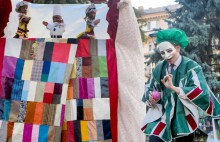The forum is being organized by the Kyiv Puppet Theater with support from the Kyiv City Administration, the all-Ukrainian NGO “Ukrainian Center of the International Puppetry Association UNIMA-UKRAINE,” and the National Union of Ukraine’s Theatrical Figures.
The contest program will include productions for children and adults, which will involve puppeteers from 16 countries: Bulgaria, Armenia, Belarus, Germany, Chile, Argentina, France, Croatia, Colombia, Georgia, Iran, Turkey, Portugal, Canada, Ireland, and Ukraine. According to the organizers of this theatrical event, audiences will see all the foreign production on the Ukrainian stage for the first time.
The festival is competitive. An international jury composed of the leading theatrical figures from Ukraine, Serbia, Hungary, and Georgia will name the best.
As the fest opens, there will be events all over the city: social platforms in various districts of Kyiv will be showing charitable performances by professionals and amateurs, including children’s theatrical teams, on September 30 from noon until 3 p.m. In the evening, at 6 p.m., representatives of the participating countries will begin a theatralized festive procession on European Square with a live drums show. At 7 p.m., Contract Square will see the premiere of “A Legend about Kyiv” with giant puppets and a fire show.
On October 3, masters will invite you to celebrate the 90th anniversary of the Kyiv Puppet Theater and see the premiere of How Huska Died, a production for adults based on a play by Mykola Kulish and staged by the noted director Oksana Dmytriieva and designer Natalia Denysova from the Kharkiv Afanasiev Puppet Theater. Their productions are always stylish and emotional, and they cause audiences to think over what they have seen on the stage.







